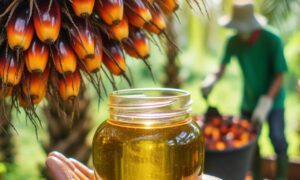Industry Leaders Call For Sustainable Palm Oil Framework In India

India: As one of the world’s largest palm oil consumers, India imports nearly 60% of its edible oil. The 2024 market reached 10.2 million tonnes and is projected to hit 14.1 million tonnes by 2033. Industry experts stress sustainable production, efficiency improvements, and private-sector involvement to balance growth with environmental responsibility.
India, one of the world’s largest palm oil consumers, imports nearly 60 per cent of its edible oil needs. The country’s palm oil market reached 10.2 million tonne in 2024 and is projected to grow to 14.1 million tonne by 2033, a compound annual growth rate (CAGR) of 3.4 per cent, according to the IMARC report.
The palm oil industry faces significant sustainability challenges, including deforestation, biodiversity loss, and social impacts. “Palm oil has a very natural limitation as to how much can be grown towards the substance,” said Sanjeev Asthana, CEO of Patanjali Foods. The solution will lie at the other oil fields, Asthana added.
The Indian government has launched initiatives to promote sustainable palm oil production, including the National Mission on Edible Oils – Oil Palm (NMEO-OP). “The government has said that nearly 1.2 million acres can potentially go into oil palm plantations. However, the success is clearly there, but it’s still a work in progress,” he noted.
Sustainability Framework And Role Of Private Sector
Bhavna Shah, Deputy CEO of NK Protein and VP of the Indian Vegetable Oil Producers Association (IVPA), highlighted the need for a national sustainability framework for palm oil. “We need something which is India-centric, verified by India, and customised for India. A voluntary framework would be more effective than a punitive one,” Shah stated.
Sougata Niyogi, CEO of Godrej Agrovet, emphasised the importance of sustainability in India’s palm oil industry. “As a grower or a growing partner with farmers, for us, it’s how we reduce inefficiencies and how we can help them improve their yields,” he said. “That’s the core of sustainability.”
Ashwin Selvaraj, Deputy Director of the Roundtable on Sustainable Palm Oil (RSPO) India, noted that sustainable palm oil is not expensive. “The additional premium that you’re paying for sustainable palm oil is less than a dollar,” he said. Selvaraj explained that it is a myth that sustainability comes at a significant cost.
Concluding the session, the panel highlighted that as India’s palm oil market continues to expand, balancing domestic demand with sustainable sourcing remains critical. The private sector, with its ability to influence both farmers and consumers, will be central to ensuring a responsible and sustainable palm oil ecosystem in India. The discussion took place at the Sustainable Trade Summit on Thursday in New Delhi.
To Read more about Edible Oil News continue reading Agriinsite.com
Source : Business World















